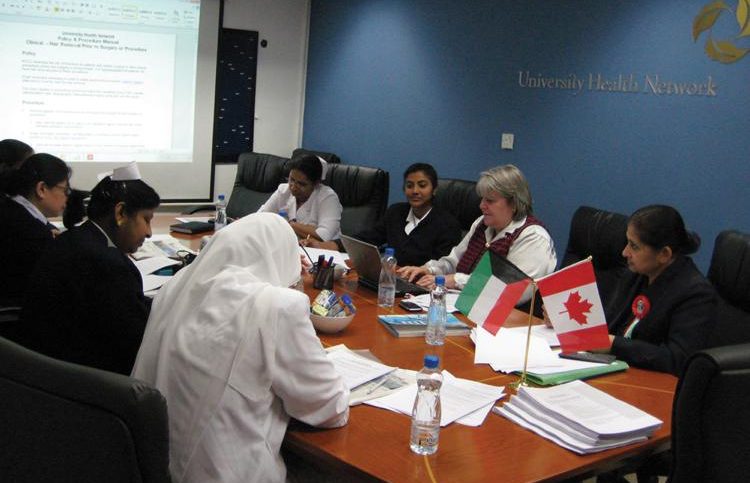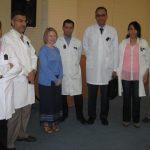In September 2010, the University Health Network, one of the largest teaching and academic health science center in Canada, signed a five-year agreement for a fee of KD 37 million with the Ministry of Health of the State of Kuwait which will see UHN providing clinical expertise to the Kuwait Cancer Control Centre (KCCC) and to improve access to quality cancer services for the local population. We catch up with the people at the UHN to let us know how cancer care is continuously improving in Kuwait.
What are the latest developments at the KCCC undertaken by the UHN?
There are several new developments at KCCC as our partnership has many aspects. One area that we have been trying to enhance with our partners is awareness and better communication with KCCC’s cancer providers and within the community. To facilitate better communication we have launched the first public website for KCCC. In this website, we have used our human factor’s lessons learned from launching our Canadian website at the Princess Margaret Cancer Centre (PMH). The Kuwait website is designed to help the Kuwait community better navigate their cancer experience. The website features both English and Arabic. Internally we rolled out a corporate intranet where KCCC staff can have at their fingertips the latest information regarding policies and procedures, online learning resources and hospital information. We also developed a cancer resource app for clinicians so that they can have UHN protocols and procedures for treatment along with international resources at their fingertips in their mobile devices.
Another tool that the partnership helped to implement is telepathology. Telepathology is a technology whereby tissue samples of tumors can be taken in Kuwait but then reviewed electronically by UHN or other international pathologist for diagnosis or confirmation of diagnosis. This technology brings the world expertise to Kuwait so that the right treatments can be given to KCCC patients and reducing time delays.
The partnership is also enhancing and expanding the traditional cancer care team. Cancer treatment is a team-based approached and must go beyond just physicians. Therefore we have supported KCCC leaders running case rounds to include the dietician, physiotherapist, social work and nursing. KCCC doctors are leading the charge in this regard. We are helping the other professions contribute to the care planning. Therefore, a KCCC patient is consulted on by a holistic team of professionals rather than receive a one dimensional treatment perspective. To further support this, UHN implemented Kuwait’s first mal-nutrition screening tool where patients who may be at a greater risk of malnutrition through their treatment are identified early and supported better. Another change has been the implementation of the safe surgical checklist. UHN instituted this checklist to enhance patient safety and surgical team communication. The World Health Organization and the Kuwait Ministry of Health also support this initiative.
What are the improvements on the communications front between the KCCC and concerned citizens and patients alike?
One of the most important issues that we unfortunately face is the negative perception of cancer. There is widespread cancer phobia resulting in people avoiding screening. Everyone should realize that cancer could be treated and that there is support specifically designed for people and their families who are dealing with this disease. There are many forms of cancer that can be treated or managed appropriately so that people can live normal lives. However, it’s important to identify such cases early so that the chances of successful treatment can be increased.
How has screening for breast cancer improved/improving in Kuwait?
KCCC is embarking on an initiative to improve care for women with suspected breast cancer through the establishment of a Rapid Diagnostic Breast Clinic. This specialized type of clinic helps to provide coordinated care, improve patient experience and decrease diagnostic delays. Under the leadership of Dr. Noha Al Saleh, Dr. Hanaa Al Khawari, Dr. Salah Al Waheeb, and Matron Darly Varaghese and in collaboration with the Princess Margaret Cancer Centre, a Rapid Diagnostic Breast Clinic is being established at KCCC. PMH’s Nurse Practitioner-Bridgette Lord helped establish a similar clinic in Toronto Canada at PMH.
Women who visit the KCCC Rapid Clinic will be given a physical exam, a mammogram, an ultrasound and a tissue biopsy if necessary, to determine if they have breast cancer within the span of one day. The aim is to have the preliminary pathology results available within 48 hours. The Rapid Diagnostic Breast Clinic at KCCC is based on a similar model created at Princess Margaret Cancer Centre and is the first of its kind to be made available in Kuwait. This will greatly positively impact screening for breast cancer in Kuwait. Furthermore, under the leadership of Dr. Hanaa Al Khuwari from the Department of Radiology, Kuwait has embarked on implementing a breast screening initiative in the Primary Healthcare Centers. The Ministry of Health has made a great investment in purchasing the screening equipment and training the technologists to run such technologies. We hope that the partnership will work hand-in-hand with such strong leadership from KCCC’s Radiology Department and the Ministry of Health.
How do regular visits from experts at the UHN benefit local physicians here in Kuwait?
The Canadian team consists of UHN Princess Margaret Cancer Centre experts based in Canada and in Kuwait. Both teams are multidisciplinary and inter-professional. The UHN Kuwait team, based at KCCC, is comprised of 16 specialized professionals including an executive nurse, a surgical oncologist, medical physicist, lab quality manager, clinical project managers, IT Team, quality improvement and health care management experts, nurse educators and nurse practitioners. In addition to this continuous day-by-day partnership, we have site visits every few months where multidisciplinary teams arrive in Kuwait and stay for the duration of 2 weeks to work with their counterparts at KCCC on enhancing systems and working through the development of policies, protocols and procedures.
What’s next for the UHN and KCCC?
The partnership between KCCC and UHN has been an exemplary one so far. Our multidisciplinary teams have been working together in order to see patients and their families at the center of care at KCCC. With one vision in mind, KCCC will achieve the best cancer care and control regionally and internationally, as our partnership works together to overcome obstacles we face daily.














